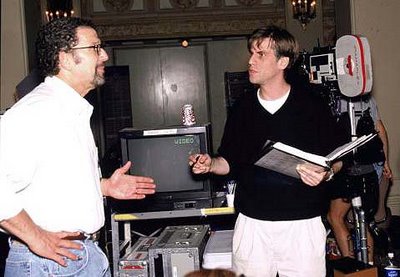 Today's column is my account of last week's TCA visit to the "Studio 60" set:
Today's column is my account of last week's TCA visit to the "Studio 60" set:Aaron Sorkin isn't happy with me. But then, he also isn't happy with bloggers, comedy writers, the Los Angeles Times and numerous other people and groups who have written unflattering things about "Studio 60."To read the rest, click here. And in reading, you may note that at one point he directly adresses me by name in response to somebody else's question about the autobiographical nature of the show. I'm the only person he did this to (on several occasions over the hour), and it's not because I was the most famous critic in the room, or the best writer, or his friend. It was because he's been reading my stuff and, as the first line of the story says, he's not happy with it or me and wanted to make that clear. As the visit was wrapping up, I made a point of seeking him out to at least discuss things, and he said I had "made it personal" by writing so much about the real-life parallels in general, and his relationship with Kristin in particular.
It's an uncharacteristically chilly SoCal morning, and several dozen TV critics and reporters have gathered to hear Sorkin explain how "Studio 60" began the season with more hype and promise than any show on television and will be lucky to end it with a renewal for next year.
The show, set backstage at a fake version of "Saturday Night Live," has its devoted viewers and critics, but as many or more (including yours truly) have attacked it for, among other reasons, a smug attitude; the unfunny nature of the sketches on the show within the show; the lack of resemblance to what we know about the real "SNL" and its backstage culture; and Sorkin seemingly using the series to settle old scores with former colleagues and girlfriends.
"We get a lot of negative press on this show," he says. "We got it on 'West Wing,' we got it on 'Sports Night,' I got it on the plays I've done, the movies I've done, and public comments that I've made... It's the cost of doing business."
The cost, however, seems higher than it has in the past.
Now, I resolved a long time ago to make my criticism be about the work and not the person doing that work, so Sorkin saying I had crossed that line struck as big a nerve with me as my writing had with him. I could make an argument that identifying what feels to me to be score-settling in the show is a criticism of the work, but I feel like I've made that point several times over in just a half-season.
So here's the deal: that column and this blog entry are the last time I'm going to write about "Studio 60" and Kristin Chenoweth together. The show's flaws, to me, go beyond that one angle, and going forward I'd rather focus on the other stuff -- both the bad and, hopefully, the good -- than to keep hammering at this one point. Back tonight or tomorrow morning with thoughts on "Monday."
















No comments:
Post a Comment